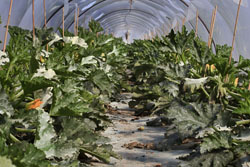New generation greenhouses for water supply
Water shortages in countries around the Mediterranean basin have been alarming while the demand for water, such as in agriculture and households, has risen considerably. The project 'Supporting the implementation of FP6 research activities related to waste water use and recycling by using new generation greenhouse systems, adapted to the requirements' (Cycler-Support) aimed to address this issue. The project investigated new technology such as water recycling and increasing usefulness of water through added nutrients and carbon dioxide (CO2) recirculation. It looked at 'new greenhouse generation' technology to render such systems viable on a large scale. Cycler-Support sought to transform greenhouse horticulture from a water-consuming activity to a water-producing one by optimising water efficiency. This involved minimising irrigation and evaporative cooling while reclaiming condensed water. Cycler-Support closely studied the recycling of wastewater for irrigation, considering regulations on contaminants and delving into previous important studies on the topic. It developed new concepts that also minimised electricity and factored in desalination of seawater while reducing costs. The project also looked at crop economics when using wastewater, as well as easy integration of the technologies in existing structures. While the new greenhouse system was three times as costly as existing technology, its feasibility increased when factoring in environmental benefits and lack of pesticides. It proved especially viable with non-edible plants since they don't contaminate the food chain. Cycler-Support recommended continuing research, testing of prototypes and training to implement the new systems. It developed an implementation guide that, among other benefits, would increase water efficiency, exploit urban wastewater and improve water capacity of land. Towards the end of the project, members held a workshop with stakeholders from various countries to disseminate knowledge and foster communication among experts. The concept was also published in various journals, opening the way to introducing this novel, eco-friendly method of saving water.







